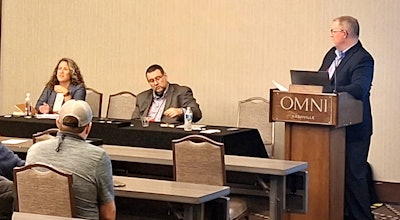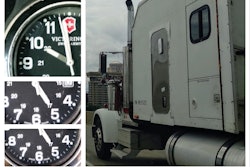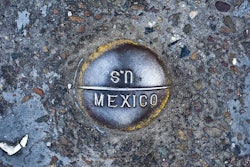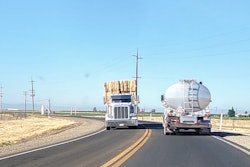Federal Motor Carrier Safety Administration Enforcement Director Tom Liberatore revealed some details of an enforcement blitz under way called Operation Protect Your Load. He dubbed it the "first general freight broker initiative" of its kind focused on violations of FMCSA's broker regulations. (Its title echoes the household-goods moving fraud enforcement initiative "Operation Protect Your Move.")
Operation Protect Your Load is specifically centered on "unlawful brokerage," Liberatore said, and is ongoing through this week and into next.
Liberatore was speaking as part of a regulatory-update panel discussion Friday at the annual conference of the National Association of Small Trucking Companies. The operation is active in 17 states, he said, focusing investigatory resources on broker entities with "recent and repeated lapses in either insurance and bonding or recent and repeated lapses in authority," a notable characteristic of brokerage entities Overdrive has reported on through the years involved in double brokering and nonpayment schemes.
"Anything strange in terms of multiple applications for authority," too, Liberatore said, presents a red flag for investigators involved in the effort ongoing, helping focus resources.

He cast the operation in the light of the agency's attempts to help tamp down fraud in brokered-freight markets broadly -- a ramp-up of downstream investigation running in tandem with the building of front-end filters for its registration system that, if effective, should prevent many of these entities from gaining brokerage authority in the first place.
[Related: FMCSA gets an earful about bad brokers, enforcement from its worst critic]
"The issues we've been experiencing with unlawful brokerage in recent years" are well-known, he said. FMCSA aims to dig into the details with the operation, to "figure out who they are, and what they are doing."
 FMCSA's Liberatore (center) was joined by Commercial Vehicle Safety Alliance Compliance Programs Director Katie Morton (left) and Steve Keppler, with Scopelitis Transportation Consulting.
FMCSA's Liberatore (center) was joined by Commercial Vehicle Safety Alliance Compliance Programs Director Katie Morton (left) and Steve Keppler, with Scopelitis Transportation Consulting.
In this trucker's case, he said, he realized he was dealing with bad actors near "the end of the second load" and had to agree to accept the original broker's much lower rate. Meantime, the fraudulent broker's bonding company eventually paid out cents on the dollar to everyone scammed -- more than a year later. Yet that payment was cold comfort for a business in the aftermath just "trying to break even" on the loads.
Liberatore offered advice about such cases that will probably sound familiar to Overdrive readers. "If you as a carrier run into an issue with an entity that you feel is engaged is unlawful brokering and fraudulent brokering," he said, use the National Consumer Complaint Database to file a complaint to help FMCSA "identify who these individuals are. You can submit that information to us -- it really does help us identify who the entities are and the patterns of behavior."
Those kinds of tips underlie the investigatory and enforcement efforts ongoing in Operation Protect Your Load, he said. "I'm very hopeful that it will make a statement that we are closely looking at the issues that we are seeing now."
[Related: A 2023-documented case of a 'take the money and run' broker scam]
Another initiative ongoing: Focus on hotshot car haulers along I-70
FMCSA's Tom Liberatore also revealed a second enforcement initiative of the on-highway variety happening through the end of this week along I-70 with a focus on hotshot car haulers. FMCSA is "working with state partners to focus on carriers engaged in this kind of operation," said Liberatore.
He emphasized the legitimacy of the vast majority of such auto haulers, but also the willingness of others to bend or break the rules, running without required carrier authority and/or ignoring regulatory reality as it pertains to hotshot operations. Hotshot haulers enjoy plenty advantages when it comes to ease of entry with less capital expense to get started. Yet for an interstate operation, the necessity of motor carrier authority remains, likewise compliance with hours-of-service regulations and so much more.
"There are plenty of legitimate auto haulers" in hotshot trucks "that comply with regulations," said Liberatore. "And there are plenty that do not."
[Related: Hotshot trucking: How to start]










